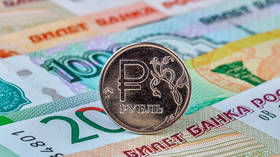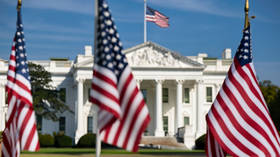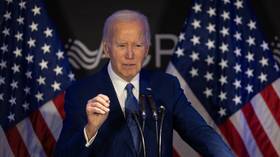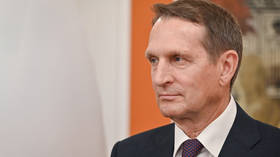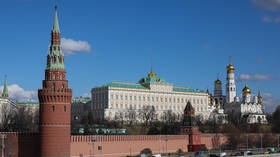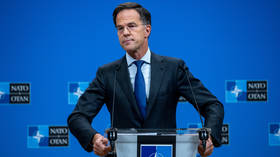EU is in serious trouble and it’s not Russia’s fault
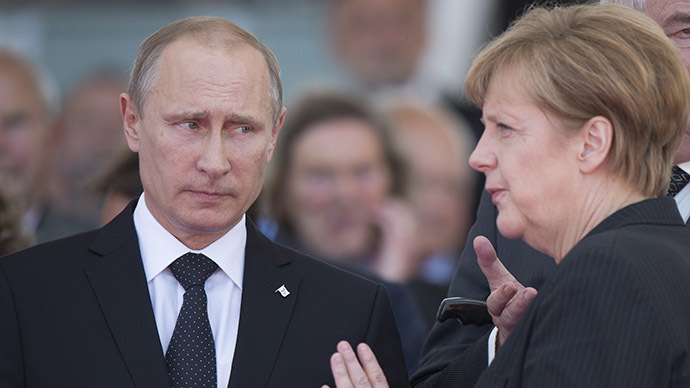
Angela Merkel has criticized Vladimir Putin’s, apparent, strategy to spread Russia’s sphere of influence in Eastern Europe. The Chancellor doesn't acknowledge that Germany’s domination of Europe has been disastrous for some states.
Europe’s neo-liberal media are having a collective hernia at the thought that some former Warsaw Pact countries are cozying up to Moscow. Especially in Germany. On top of that Merkel's recent speech in Australia was full of tough criticism of Russia. However, on closer inspection, what they are accusing the Kremlin of doing is exactly what the EU has been at for the past 20 years.
Do a random street poll in any eastern European capital. Prague or Bratislava, where I have been this week, for example. Ask whether life is better now, under the thumb of the EU, compared to how it was in 1989, under the Soviet jackboot. The responses I have gotten are 50-50. If you’d tried the same query a decade ago, it’d have been fairly unanimous that 2004 would have trumped ’89.
The EU is in serious trouble. Living standards are falling all over the union and political instability is fomenting from Dublin to Athens and Madrid to Zagreb. Iceland recently u-turned on a plan to join the grouping and, previously, resolute aspirants like Serbia and Montenegro are cooling their ardor for membership.
Angela Merkel thinks this is Russia’s fault. That’s akin to blaming Brazil’s strikers for their 7-1 World Cup capitulation to Germany. Pure hokum. If Merkel wants to find the real culprit, she need only look in the mirror. The Berlin government, which she has led for 9 years is sucking the continent dry. While peripheral states flounder and pivotal countries stagnate, Germany is doing just fine. This is because the entire EU system – especially the Euro currency – is propping up its largest member while choking the rest.
Thatcher's wisdom
Of course, Britain’s Margaret Thatcher and France’s Francois Mitterrand warned of this a quarter century ago, and they were both spot on. In January 1990, Mitterrand confided to his UK counterpart: “reunification will result in Germany gaining more European influence than Hitler ever had.”
It’s worth mentioning, in fairness, that the ugly Euro currency monster was Mitterrand’s, naive, attempt to curtail this eventuality. The Germans were quite content with the solid Deutschmark but Paris believed that a currency union would keep their neighbors in check and made it the price of agreeing to a united Germany.
Thatcher foresaw this and informed Mitterrand that Bonn (the then capital) wouldn’t be tamed by strengthening EC (later EU) institutions. “Germany’s ambitions would then become the dominant and active factor,” she counseled. She added: “We beat the Germans twice (in war), and now they’re back.”
Following reunification, a previously 4-pronged European elite (France. Britain, West Germany and Italy) became greatly diluted. Restored to its former capital of Berlin, the, now much larger, state began to dominate. In the early 00’s, the EU expanded massively to the east, growing by 10 members in 1 day in 2004, with a further 3 following later. What happened in all these newbies, from Estonia in the north to southern Cyprus was that German commerce rapidly swarmed their economies. If you think that’s fanciful, I’d urge you to visit a shopping center in Krakow or Brno and tell me how it, greatly, differs from one in Dresden? To my eyes, not by much.
Existing members, such as Ireland and Spain were flooded with cheap German credit. This was basically a form of captive loan-sharking. German banks handing out easy money to facilitate the purchase of German-made goods, from cars to electronics. When the scheme went wallop in 2008, the German creditors didn’t accept a haircut. Instead, the penalties were passed on to Irish and Spanish taxpayers, further enslaving them to Berlin.
Germany the winner
Meanwhile, Germany’s trade surplus continued to expand and they were happy to leave the rest of Europe to rot. Instead of showing empathy, the Hamburg and Berlin media were full of features mocking the economically wrecked nations. Ireland, apparently, had an epidemic of wild, abandoned, horses and the Spanish were delighted at the extra time for Siestas. Oh, what fun the yellow-press had in those halcyon days – and what harm they did to perceptions of Germany.
Now, Merkel seems to believe that Russia is coercing some European states into doing business. Complete nonsense. It’s rather more believable that financially stressed governments have begun to see through Berlin’s practices and are hedging their bets. After all, it’s the duty of a sovereign to look after its own citizens, not the pampered bankers of Frankfurt or industrialists of Munich. Germany’s arrogant mistreatment of the rest of Europe is coming home to roost.
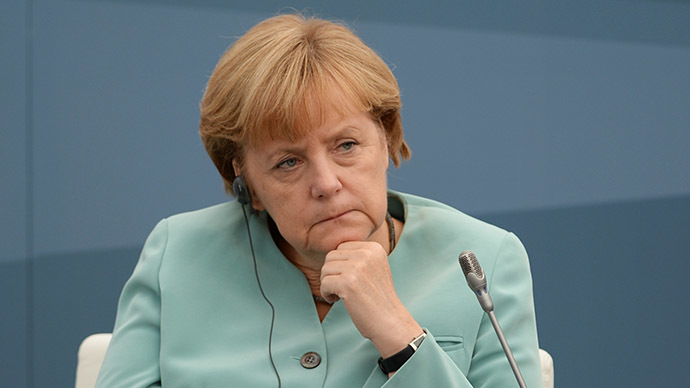
“Frau Nein”, as she was once known, is especially upset about Russian influence in Hungary and Serbia. Apologies if I’ve missed something but I haven’t noticed the reports of Berlin heaping goodies on them. Does Merkel seriously expect their rulers to reject advantageous deals with Moscow to keep her happy? If she does, she’s lost touch with reality.
“This is not just about Ukraine. It’s about Moldova. It’s about Georgia. If things carry on like this…. we will need to raise the issue of Serbia, of the states in the western Balkans. How can something like this happen in the middle of Europe? Old thinking about spheres of influence… must not succeed,” the Chancellor emoted last weekend.
Doing what's right
What Merkel is trying to say, with breathtaking arrogance is “how dare Russia nose in on our patch” - as if Germany had a divine right to control these independent nations. Spheres of influence aren't an issue once they are tilted towards Berlin or Brussels, which the former increasingly controls. Lost in all of this is the economic fact that Germany and Russia are now neck and neck economically, with Moscow poised to overtake its historic rival in the next few years. Russia has also succeeded in creating an alliance with China, Germany's biggest export rival. This has forced Berlin into solidifying its previously waning alliance with the USA, something which isn't uniformly popular in Germany.
However, in Budapest and Bratislava, premiers Viktor Orban and Robert Fico are doing what’s right by their electorate and striking the optimum deals for their countries. Merkel is deeply offended by such a practice as it reduces Germany’s omnipotent strangle-hold on their commerce. Orban is also committed to pushing ahead with the Southstream pipeline, in partnership with Moscow. Why? Not to undermine Berlin, but to guarantee its energy supply because Ukraine is unreliable as a transit territory. This is entirely understandable – it’s Orban’s job to look after Hungary, not to bow down before Germany.
The pro-NATO, neoliberal, media in Western Europe are presenting Russia’s trade deals with struggling eastern states as some kind of dastardly plan to undermine the EU. Such suggestions are hyperbolic nonsense. The leaders of Hungary, Slovakia and Serbia would, gladly, bite the hand off Merkel if she was willing to throw some German cash around. However, she’s not and Putin is. Consequently, these countries are doing what's best for their current circumstances. There is nothing sinister about it.
The statements, views and opinions expressed in this column are solely those of the author and do not necessarily represent those of RT.
The statements, views and opinions expressed in this column are solely those of the author and do not necessarily represent those of RT.




